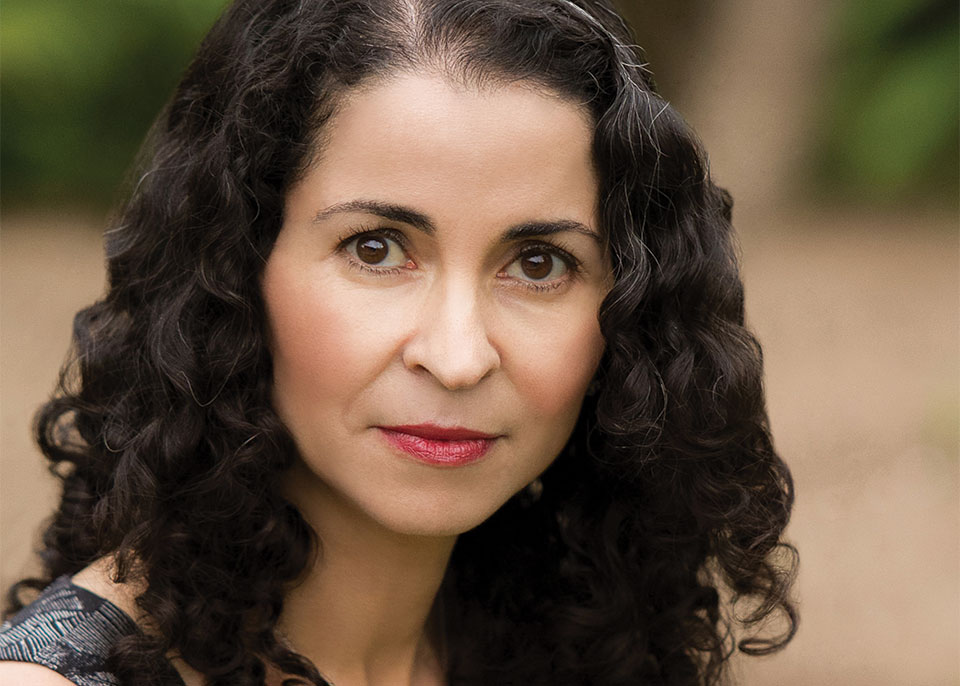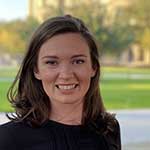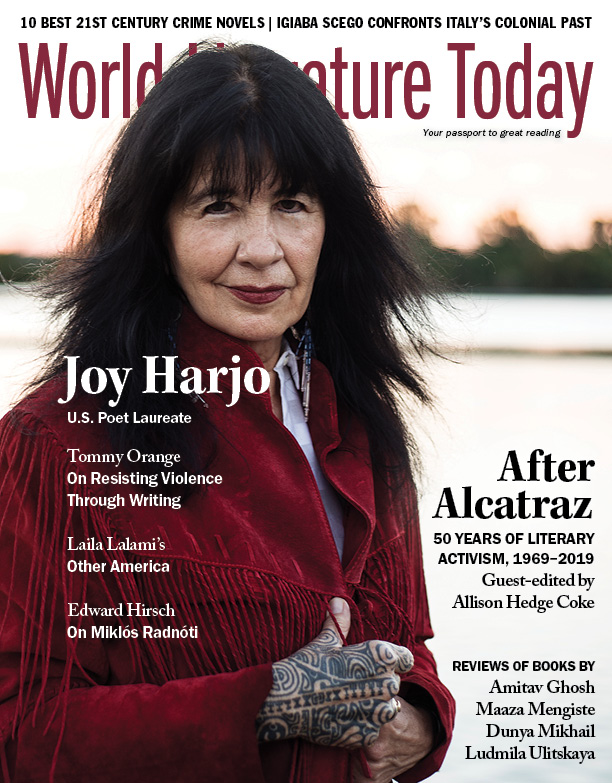Cultivating Empathy and Humility: A Conversation with Laila Lalami

Laila Lalami is a professor of creative writing at the University of California at Riverside. After earning a BA in English from Mohammed V University in Rabat, she moved to the UK to complete an MA in linguistics and then the United States for her PhD at the University of Southern California. She has published four novels and received widespread critical acclaim. The Moor’s Account was longlisted for the Man Booker Prize and selected as a finalist for the Pulitzer Prize. Her most recent novel, The Other Americans, was released in March 2019.
Jocelyn Frelier: I was hoping we could start our conversation with a couple of questions I have about your most recent book, The Other Americans (see WLT, Spring 2019, 79). One of the things that struck me in reading the book was the wide variety of minority identities you feature in the book’s cast of characters. Without spoiling the plot too much, we see an Arab American family, an undocumented immigrant, a pair of veterans, and a black, female detective, to name a few. Could you tell us a little bit about how these characters came about and what the process of forming their identities was like?
Laila Lalami: Well, I would say that the process was very natural and organic. I knew I wanted to write a story about a young woman who returns home after her father is killed in a hit-and-run accident; I’m Moroccan, my protagonist is Moroccan, and I wanted this Moroccan family to be at the center of the story, so that was an immediate and easy choice.
As far as the other characters go, it’s important to note that the story is set in California—one of the most diverse states in the nation. I live in Los Angeles, where 40 percent of the residents are foreign-born, and it seemed natural that the book would reflect that.
There are a few narrative reasons why these characters ended up with the backgrounds that they have. For example, with the hit-and-run accident, I wanted to add to the suspense and the mystery element of the novel, so I needed the witness to not immediately come forward. One way to work that in was to give him a reason; the idea was that if he were undocumented he would fear coming in contact with law enforcement.
Overall, there were different reasons why these characters ended up having diverse backgrounds, but all those reasons were either driven by the needs of the narrative or because I was interested in writing them. In some ways, I feel that diversity is the default, particularly in a state like California. A story that doesn’t feature diversity is maybe the story that needs to be questioned because it wouldn’t necessarily be realistic.
Frelier: I’d like to follow up about one character in particular—Fierro. As a reader, I felt suspicious of him for a large chunk of the novel, and then it seemed he was struggling with mental illness. What’s his contribution to the story arc?
Lalami: You know, he’s one of those characters who sort of popped up, out of the blue, fully formed. He comes up in the subplot that belongs to Jeremy, who is a veteran of the Iraq War and a former classmate and friend of Nora, the main character. I wanted Jeremy to have a full life, filled with concerns about work, family, and friends, which is where Fierro came in. I became interested in Fierro because he presented the opportunity to explore so many themes: male friendship, misogyny (his attitude toward his wife and toward Nora is really troubling), masculinity, and even toxic masculinity. He was the perfect character for exploring all of that.
With Fierro, I tried to imagine somebody who enlisted in the war at the same age as Jeremy and from the same area but who had his own life story. Because of the hit-and-run mystery you’re asking yourself, “Who did it?” and it occurred to me later that anybody who sees a character like him might immediately be suspicious of him due to the way that he talks and behaves. I wanted to play on those expectations a little bit.
Frelier: So many of the topics you address in the book dovetail neatly with urgent questions across the United States over the last few years. How do you see the relationship between your book and the changing political landscape across the US? Specifically, did the content of the book shapeshift at all with the increasingly visible division across the country or with political events?
The United States may be governed by a different party or a different man, but the country is pretty much the same as it was before the 2016 election.
Lalami: Yeah, this is an interesting question that I asked myself when I was writing. I started working on the book in the summer of 2014, and by late 2016 I had three drafts. After the election, I went back and looked at the book and thought, “Does anything need to change?” And I realized that nothing needed to change.
The United States may be governed by a different party or a different man, but the country is pretty much the same as it was before the 2016 election. The only thing that this new administration has changed is who is in power and who feels emboldened to speak. But the issues, the underlying sentiments, and the divisions were already lying there waiting to be revealed.
So, I didn’t change anything—the novel is still set in 2014. And if it reads differently it is only because, as I said, we are seeing a particular upswing of nativist rhetoric and nativist behavior. But the underlying issues were always there. It’s not as if there was not anti-immigrant, anti-Arab, anti-Muslim, or even anti-veteran sentiment before 2016. The book references all these things but does not refer to any specific administration at all.
Frelier: I got interested in your work in part because it is a literary depiction of members of the North African diaspora but also because of the attention you pay to the role of family. Have you previously given any thought to the role of family in The Other Americans or in your other work, and, if so, how do you see it?
Lalami: One of the main things I was thinking about while writing The Other Americans was family alienation. I thought about how sometimes the people we love so much can be the people who hurt us the most or who are most difficult to live with.
In fact, after the 2016 election, I had so many friends (and family, really) who would say, “Oh my gosh, I can’t talk to my aunt” or “I can’t talk to my uncle, because . . .” That kind of alienation can be driven by outside events, like political events, but also by private histories. People who love us are not necessarily the best caretakers of us. The book explores that theme and poses those questions: What do you do with that? Do you stick with people who love you regardless of their behavior? Or do you choose your own family? Does the answer lie somewhere in between those two extremes?
So, family was definitely a theme that was on my mind as I was working on the book.
With The Moor’s Account . . . I’m trying to think, I wouldn’t say that family is something I was prioritizing in the telling of that story, but family is definitely at the heart of the story and, particularly, the relationship between Mustafa/Estabanico and his mother. This is a relationship that is centered around the passing down of stories, family legacies, and oral histories. In Secret Son, there’s a broken family. I guess you could say family is a running theme through my work. But with The Other Americans it was definitely at the forefront of my mind.
Frelier: You’ve published a number of opinion pieces on all the hot topics: white nationalism, health care, ICE, sexual harassment, mass shootings, etc. I have to imagine you see those essays as related to your work as a novelist (but maybe not!), and I was hoping you could comment on writing in multiple genres (novel, essay, chronicle) and the overlapping themes.
Lalami: In my role as a columnist, I’m intentional about covering a wide range of topics. Underlying all of them is the notion of the rights of the individual: the right to health care, the right to be free of harassment, etc. This writing is really driven by a concern for human rights.
But writing the column is a completely different thought process than the one required for writing fiction. Typically, when I’m writing the column, I’ll reflect upon something and have an idea of where it’s going before I sit down to write. Before I start writing, I might research things, talk to people, explore a couple of options, etc., but I have a strong sense of where it’s going. I use my judgment to form clear opinions and express them.
With fiction, the process is different because I don’t know where the story is going. I’ll know that I want to write, say, a story about a young woman whose father dies. And I’ll know I want that story to explore grief. But I never exercise any moral judgment on the characters. To me, they are just characters. By withholding judgment, I can look at the world, through their eyes, with humility. I don’t judge them as “good” or “bad”; they are all flawed human beings. I would say this kind of writing uses a different muscle—it relies much more on the powers of empathy. In contrast, the essays and columns will ultimately take a side and I will formulate an opinion and have a thesis.
In terms of the themes—all four of my books have something to do with crossing borders, displacement, migration, as well as identity formation and the idea of belonging. I’ve also explored the idea of narrative power and asked the question, “Who gets to tell stories?” The essays include a much wider range of ideas; I write about whatever strikes my interest, excites me, angers me, provokes me, or even amuses me.
I never exercise any moral judgment on the characters.
Frelier: In addition to being a writer, you’re also an educator, and you’re actively shaping the next generation of writers. Do you have any advice for students or readers who want to find themselves in your shoes one day?
Lalami: I teach creative writing at the University of California at Riverside, and I always say that I have the best job because I get to sit in a classroom with smart young people and talk to them about literature. There’s no downside to a job like that.
The advice I would have for younger writers or student writers (and this is something I tell my students all the time) is just to read, and read, and read, and read, and read. And to read eclectically! Read across genres. When you read something you think is particularly striking or impressive, read a second time, read like a writer. Ask yourself, “How does it work? What works? Is it the structure? Does it have to do with the characters? Is it the prose?” Take notes about what works and what doesn’t work as you read. I have marginalia in all my books.
So, in short, be just as mindful of your reading practice as you would of your writing practice. The two are intimately connected—you can’t really write without reading. The rest of it, like some of the technical stuff or the professional development side, will come with time. At the core of everything is the practice, the habit of sitting, of reading every day, of analyzing what you’ve read, and of writing every day. It really does require, I would say, enjoying being alone with your practice.
The development of empathy is crucial to personal growth as a human being but also as a writer.
Frelier: If readers were to take away a message or a life lesson from your work, what would you want it to be?
Lalami: There are two things that come to mind in my work. The first is empathy, which doesn’t always mean the same thing as “agreement”—it just means the ability, for the duration of that book, to see the scene, or the situation, or the issue through somebody else’s eyes. The development of empathy is crucial to personal growth as a human being but also as a writer.
The second thing that I think is really central for me and my work is humility. I don’t think you can produce great work without practicing humility. You have to be able to listen to the characters and to other people around you and make your best effort, with the knowledge that you might not get it right. This is particularly hard when you are writing characters who are very different from you. Humility is at the center of that. Have you done your research and decided what this person’s occupation might be or where they live? Have you given them as much attention or invested as much in their background as you would another character? All that is rooted in humility.
Frelier: Can you tell us anything about your next novel? What should fans expect from you next?
Lalami: I’m currently working on my first book of nonfiction. It’s called Conditional Citizens, and it’s going to look at the relationship of the citizen to the state and how that relationship is undermined or shaped by issues like race, gender, and creed.
May 2019











